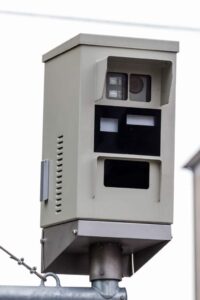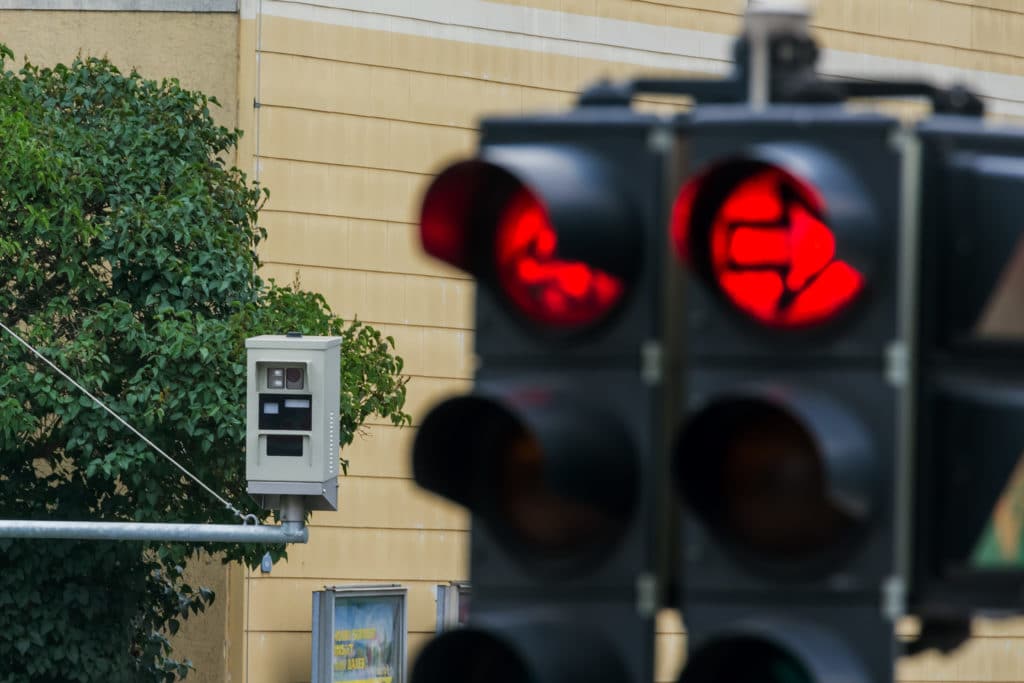What are red light cameras?
Traffic infraction detectors, commonly called red light cameras or red light cams, are installed at high-traffic intersections around Florida and throughout the country. They often look like old-school video or movie cameras—large, obvious, and with a huge eye-like lens focused toward the street.
How do red light cameras work?

They can take still snapshots or record ongoing feed of traffic, and their purpose is to capture images of license plates when vehicles run red lights or make right turns on red where prohibited. Information is reviewed, and tickets are sent to violators by U.S. mail. A typical violation costs between $75 and $200, depending on the issuing jurisdiction.
Where are red light cameras in Florida located?
According to the Florida Department of Highway Safety and Motor Vehicles’ most recent report (July 1, 2016 – June 30, 2017), 63 jurisdictions (Florida cities) operated 638 red light cameras during that fiscal year.
A number of participating cities and deployed cameras have been dropping, though, since the state first allowed them in 2010.
Miami-Dade County
Miami just ended its use of red light cams, but 15 other cities in Miami-Dade still use them.
Broward County
In Broward, red light cams are located in:
- Davie
- Pembroke Pines
- Sunrise
- Tamarac
- and West Park
Palm Beach County
In Palm Beach County, Boynton Beach is the only city that currently uses red light cameras, and that’s after the city shut them down in early 2017 and then re-started the program in late 2017. They are located at:
- Southbound on Northwest Eighth Street at West Boynton Beach Boulevard.
- Eastbound on Boynton Beach Boulevard at North Seacrest Boulevard.
- North- or southbound on South Federal Highway at Southeast 23rd Avenue.
- East- or westbound on East Gateway Boulevard and north- or southbound on North Congress Avenue.
- Eastbound on West Boynton Beach Boulevard/Northwest Second Avenue and northbound on North Congress Avenue.
- East- or westbound on West Woolbright Road and north- or southbound on South Congress Avenue.
- Eastbound on West Woolbright Road at Southwest Eighth Street/Corporate Drive.
Unfortunately, neither the Florida Department of Transportation nor the Department of Highway Safety offers a single, up-to-date way to determine all camera locations; that’s because every city holds a different private contract and is responsible for its own program. To determine if your local area or most-traveled routes are using red light cams, check out this map of user-generated data, but keep in mind that it may not be completely up-to-date and accurate. For the most accurate information, you’ll need to look at each city’s website. Boynton Beach, for instance, posts red light camera locations, the fine schedule, and the citation process on their website.
Florida Supreme Court Rejects Challenge to Red Light Camera Statute
The Florida Legislature passed the Mark Wandall Traffic Safety Act in 2010. The law authorizes the use of traffic infraction detectors on state, county, and municipal roads, streets, and highways in the state.
A local jurisdiction can authorize a traffic infraction enforcement officer to issue a traffic citation, and that’s one source of controversy: Because the red light cameras have been installed and monitored by external, private, for-profit contractors—rather than by the cities and city employees themselves—recipients of traffic tickets have argued that such citations are invalid.
Several challenges to the Act have been mounted over the years, and the Courts of Appeal within the state are split on the issue. The Fourth District ruled that cities are “not authorized to delegate police power by entering into a contract that allows a private vendor to screen data and decide whether a violation has occurred before sending that data to a traffic infraction enforcement officer … to use as the basis for authorizing a citation.”
In contrast, the Second District is in agreement with the Third District Court of Appeal’s position that holds: since the traffic enforcement officer “makes the determination about whether probable cause for a violation exists and whether to issue a notice of violation, no unauthorized delegation of police power has occurred.” The Florida Supreme Court agreed to rule on this issue to resolve the split among the District Courts of Appeal.
Jimenez v. State
In its May 3, 2018 opinion Jimenez v. State, the Florida Supreme Court sided with the Second and Third Districts and held that the red light camera statute “authorizes a local government to contract with a private third-party vendor to review and sort information from red light cameras, in accordance with written guidelines provided by the local government, before sending that information to a trained traffic enforcement officer, who determines whether probable cause exists and a citation should be issued.” Therefore, cities within Florida may utilize red light cameras that are installed, maintained, and monitored by private, third-party vendors.
The case began when Luis Torres Jimenez received a traffic ticket from the City of Aventura for making a right turn on a red light at an intersection marked with a “no-turn-on-red” sign. The infraction was caught on a red light camera. He did not dispute that he committed the infraction itself; rather, he challenged the legality of the city’s red-light enforcement program, which included the use of a third-party agent to review pictures from the camera system prior to sending them to the city’s police department for the determination whether a traffic ticket should be issued.
Jimenez moved to dismiss his ticket in county court, arguing that the city’s red-light camera program illegally gives the private vendor unfettered discretion exceeding the statutory authority to use an agent to review pictures from red light cameras. The court dismissed his ticket, citing the Fourth District’s opinion in which it stated that a similar red light camera program operated by the City of Hollywood constituted an unlawful delegation of the city’s police power. The county court then certified the question to the Third District.
The Third District rejected the argument that the red light camera programs amounted to an impermissible delegation of police power. The court explained that “the type of evaluation exercised in the Vendor’s decisions is clerical and ministerial” and thus does not amount to the exercise of the city’s police power. Additionally, the court noted that no ticket is ever issued unless an officer with the police department examines the picture and concludes that probable cause exists for issuing a traffic ticket. That is the same standard for issuing a roadside ticket, the court stated. Accordingly, the Third District concluded that there was no unconstitutional delegation of authority and reversed the dismissal of Jimenez’s ticket.
On appeal, the Florida Supreme Court affirmed and approved of the reasoning articulated by the Third District. The Court also specifically approved of the Second District’s position on the issue while rejecting the Fourth District’s position. Accordingly, red light camera programs whose procedures and guidelines mirror those of the City of Aventura’s are constitutional and permitted throughout the state.
Aftermath of the Supreme Court Decision
For all practical purposes, the recent Florida Supreme Court decision likely won’t affect drivers in Palm Beach County that much, if at all. As of the date of this article, only Boynton Beach has an active red light camera program. Its program was operating before the Supreme Court decision on May 3, 2018, so it’ll simply continue operating now that the high court has announced that such programs are permissible within the state. So nothing’s changed.
Boca Raton and Delray Beach both told local news outlets that they have no plans to implement a red light camera program following the Supreme Court decision. In fact, no city within Palm Beach County has indicated that it plans to introduce any such program now that the Supreme Court has ruled on its legality.
Thus, while the Supreme Court decision has brought clarity to the issue of the constitutionality of red light camera programs, cities within Palm Beach County don’t appear to have any interest in rolling out their own program any time soon.





